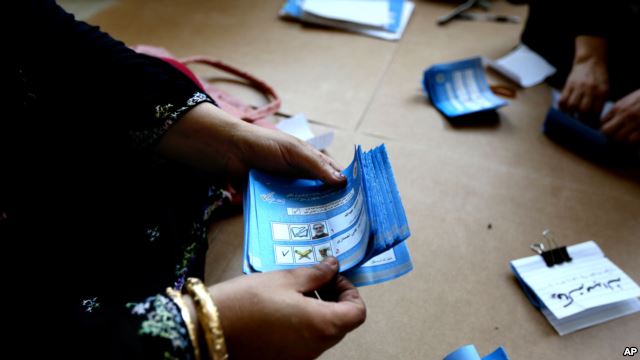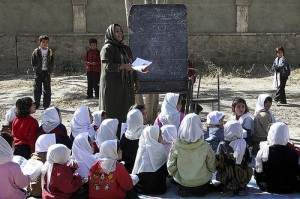
As of July 22, the Afghan presidential election does not have a clear winner as the official audit has stalled due to a “misunderstanding,” according to the Independent Election Commission (IEC). The IEC did not elaborate as to what exactly a “misunderstanding” means. Although both presidential candidates had initially agreed to an audit of the ballot boxes and to forming a unity government, they appear to be at odds over the audit method and most of the 23,000 ballot boxes remain to be counted. Additionally, the Taliban has been actively engaging the state army in recent weeks, with a major offensive in the southern province of Helmand, in an attempt to hinder the transition process.
Widespread allegations of corruption and election fraud have so far marred the country’s transition to a stable democratic regime.
According to preliminary results released by the IEC on Monday, July 8, presidential candidate Ashraf Ghani holds a significant margin of votes over his rival Abdullah Abdullah in the Afghan runoff election. Ghani, the former Finance Minister and former U.S. citizen who gave up his passport to run in the 2009 presidential election, received 56.44% of the runoff vote or roughly one million more votes than Abdullah, the former Foreign Minister, who received 43.56%.
In April’s first round election Abdullah garnered 45% of the vote to Ghani’s 31.6%. A runoff election was required as candidates need to receive more than 50% of the vote to win the election according to Afghanistan’s election law. Despite releasing the preliminary results, the IEC stressed that the final results would be announced on July 22, and that the initial results were not necessarily an indication of the final outcome.
Although the runoff election was hailed as a progressive movement in the country’s move to establish a fair democratic government, the process has been marred by widespread allegations of election fraud and ballot box stuffing on both sides. The latest delay in the audit process is not unprecedented. Following poll closures on June 14, Abdullah alleged that Zia Amarkhel, the head of IEC, was directly involved in election fraud in favour of Ashraf Ghani. His campaign released an audio of a series of secretly recorded phone conversations of Amarkhel speaking with members of Ghani campaign team and other election officials. The authenticity of the recording could not be confirmed, but it fueled further unrests in Kabul as Abdullah’s supporters took to the streets to protest the alleged fraud.
On Tuesday, July 8, Mr.Abdullah stopped short of announcing his plans to form a separate government, potentially parallel to the official one. He announced that he was withdrawing from the official ballot counting process because of widespread election fraud in favour of Mr. Ghani. He also called on his supporters to refrain from violence in the streets and asked them to be patient as his campaign team worked on insuring the fairness of the election results. The official statement issued by the campaign read, “In any of your moves, prove that you are good and obedient citizens who respect the law”.
For his part, Ashraf Ghani has claimed that his campaign team was the victim, not the perpetrator of fraud. He stated that they had filed more than 1,800 complaints to the official election monitors and that he would reject any ballot cast for him if it was found to be illegal. Ghani believes he has won the contested election by more than 1.3 million votes, the majority of which came from the eastern and southern Pashtun-dominated regions. He credits the heavy involvement of clerics, larger female voter turnout, and a number of televised town-hall style meetings for enabling him to receive more votes.
Amid the controversy, Zia-ul-Haq Amarkhail, the head of the secretariat of the IEC, resigned on Monday, June 23, due to allegations that he sided with Ghani in the runoff election. His resignation came a day after Abdullah released the audio recording of alleged communication between Amarkhail and the Ghani election team. Although Amarkhail has denied any involvement in fraud and has spoken out against the allegations, he said he resigned for the greater national good and to ensure that the democratic election process moves ahead in Afghanistan. The United Nations Assistance Mission in Afghanistan (UNAMA) officially recognized the resignation as a step that helped protect the country’s political transition and ensure a timely electoral process.
Washington has been involved in monitoring the elections process as US troops prepare to completely exit Afghanistan in the near future. Secretary of State John Kerry arrived in the country on July 11 to meet with Abdullah and Ghani in order to discuss the electoral crises and ensure it would not endanger the democratic transition in the state. The IEC expects to complete the audit no sooner than late August.




